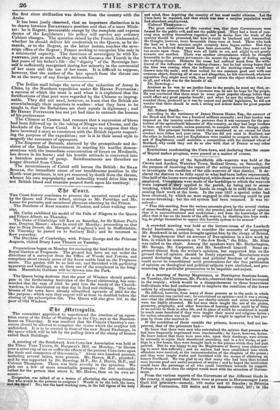A meeting of the Southwark Anti-Corn-law Association was held at
the Three Tuns Tavern, St. Margaret's Hill, on Monday, "to discuss over a sober cup of tea or coffee the effects of the present Corn-laws upon the trade and commerce of this country." About two hundred persons, including several ladies, were present. Mr. Hawes, M.P., presided ; and he was supported by Dr. Bowring, M.P., Mr. J. Harris, M.P., and Colonel Thompson. There was little novelty in the speeches. We pick out a few of more remarkable passages ; the first noticeable rather for the person that utters it, Mr. Hawes, than on its own account— Emigration was talked of as a means of alleviating the existing distress. But who would be the persons to emigrate ? Would it be the halt, the lame, .4d *hoed ? No; but the hard-working man, in the full vigour of his body and mind, thus depriving the country of her most useful citizens. Let the Corn-laws be repealed, and that which was now a surplus population would find abundant employment.
Colon el Thom pson The great misfortune of this country was, that their Governments were formed for the public evil, and not the public good. They had a knot of cunning men setting themselves together, not to devise how the trade of the country should be promoted, but how it could be hindered and trammelled. He thought, however, more favourable times were at hand. Those who took the lead on a late occasion might certainly have begun earlier. Had they done so, he believed they would have been successfuL But they must not be too severe upon them. They were all liable to err, and right to act gently towards one another. There was another circumstance which he thought favourable to the present mevement—he meant the change of feeling among the working-classes. Hitherto the cause had suffered much from the withdrawal of the influence of the working-classes ; but he had strong hopes that the time was coming when the influence of the working-classes would be thrown into the scale ; and thus united for one common good and with one common object, drawing all at once and altogether, he felt convinced, whatever opposition they might meet with, they would attain the object which was dear to all, and which was for the benefit of all.
Dr. Bowring
Anxious as he was to see justice done to the people, he must say that, organized as the present House of Commons was, he saw ho hope for the people. He was convinced that there must be some great popular change before they could effect any great popular benefit ; and when he saw the misery that surrounded them, produced as it was by unjust and partial legislation, he did not wonder that there should be such a strong and ardent desire for great popular changes. Mr. Sidney Smith— According to the testimony of James Deacon Hume, Esq., the amount of the Bread and Beef tax was a hundred millions annually; and that burden was imposed on the country under the pretence that it was necessary for the protection of the agricultural labourers of this country, as they had large burdens to bear, and were unable, unless protected, to compete with the foreign graingrower. The principal burdens which they mentioned as an excuse for their conduct were tithes and poor-rates. The one did not exist in Scotland, nor the other in Ireland, and yet Englishmen were enabled to compete with them ; and if Englishmen could maintain a competition with the untaxed wheat of Scotland, why could they not do so also with that of France or any other country ?
Resolutions condemning the Corn-laws, and declaring that the cause of Repeal makes progress, were passed as a matter of course.


























 Previous page
Previous page